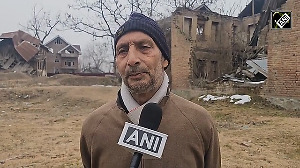A group of onion traders gathered at the Pimpalgaon Agricultural Produce Market Committee (APMC), near Nashik, to inspect one of the season’s final harvests of red onions as they look to place their bids.

They were surrounded by farmers, who brought their produce here from different parts of the district.
Farmers have reasons to be optimistic.
Sagar Borse, a 21-year-old resident of Chandori, arrived at the mandi during the early hours of the day and was beaming with joy.
The young farmer anticipates a better price for his produce than in the previous year on account of a limited supply of the bulbs, the lifting of the ban on exporting onions in May, and finally the much-awaited election season in the state.
Within no time, Borse receives a pink receipt from a trader who purchased his 20-quintal harvest at Rs 3,800 per quintal. He exhales a sigh of relief since this belt of onion producers have borne the brunt of fluctuating policies, including an export ban leading to a drop in prices of the kitchen staple.
“Our only expectation from the government is that the price of onions should be maintained at Rs 4,000-5,000 per quintal as it was before the export ban,” he added.
It is only now, after a long wait, that this onion-producing belt has seen an increase in prices, which were hovering around Rs 2,000 per quintal last year.
The onion is a politically sensitive crop and Nashik counts itself as one of the major producers of these bulbs in the country.
Challenges around pricing and production can quickly swing public sentiment, as it was evident during the Lok Sabha elections this year.
“The Bharatiya Janata Party (BJP) faced major losses in this belt during the Lok Sabha elections purely because they flipped policies and did not give us the right price,” another onion producer Praveen Jadhav said.
National Democratic Alliance (NDA) candidates including a former Union minister lost to those from the Indian National Developmental Inclusive Alliance (INDIA).
The onion belt in and around Nashik has 15 of the state’s 288 seats.
However, right pricing in Nashik alone does not guarantee electoral success as discontent simmers among farmers across the state.
For instance, soybean and cotton producers in Rohilagad, near Jalna, continue to vent their frustration on shrinking prices in a region that historically receives little rain.
“Soybean is trading at Rs 3,800 and cotton at around Rs 7,000 per quintal this year.
"The prices were around Rs 7,000 and Rs 12,000 respectively just two years back.
"With increasing labour and pesticide costs, how does the government expect us to earn a living when pricing continues to reverse its course,” said a 50-year-old Arjun Takle in Rohilagad.
With little to earn from the fields, Takle has now invested some capital in setting up a hardware store that “barely covers” his daily expenses.
Places like Rohilagad in Marathwada, however, are enjoying brighter days than the previous year because of better rain this year.
Water levels in lakes and wells, which supply water to acres of cotton, soybean fields and sweet lime orchards, are better than the previous year, residents claim.
“If we remove produce pricing from our electoral equation, the rest is better this year.
"However, the struggle for drinking water continues.
"We rely on a tanker since the village gets water once in 15 days only,” said Ram Dudhate, another resident.
Back in Nashik, the country’s main grape-growing centre, farmers are looking for skilled labourers who would harvest the vine orbs.
The harvest this year comes years after some farmers in this belt went through losses running into crores.
“Exports were stopped during lockdown, and then import duty on the fruit was increased in countries like Bangladesh.
"We saw our vineyards being destroyed by unseasonal rain last year, and there was an absence of political will to help us through this situation,” said Shashikant Mogul, a grape farmer in Sukena near Nashik.
To add to the challenges, the region sees a shortage of labour this year.
Some claim that the Ladki Bahin (roughly translated to dear sister) scheme, which provides women cash worth Rs 1,500 per month, has discouraged them from working in fields.
“Farm labourers get Rs 300-500, depending on the skills that they offer.
"We have also seen cases where farmers have requested contractors to bring workers from neighbouring states like Madhya Pradesh,” Ankush Patil said.












 © 2025
© 2025